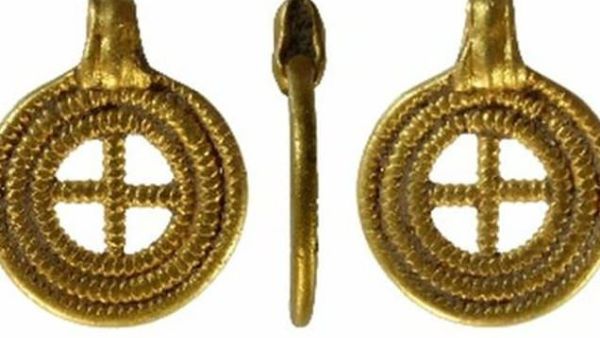An Anglo-Saxon pendant unearthed in 2017 near where a similar item worth £145,000 ($192,645) was dug up has been declared treasure by the coroner's office.
The Winfarthing Pendant, valued at £145,000,($192,645) was dug up on farmland in 2014 near Diss in Norfolk by a student.
The gold piece has a central cross motif and probably belonged to a woman of 'high social status', according to experts.
It features gold bead work and measures 17mm (0.67in) by 13mm (0.5in), and is believed to date from the late-6th Century to the mid-7th.
It was declared treasure by the Norfolk coroner, which means that ownership now lies with the Crown.
It will be valued by the Portable Antiquities Scheme run by the British Museum.
Julie Shoemark, Norfolk's finds liaison officer, said it made a 'valuable contribution to our understanding of Saxon society'.
Ms Shoemark, from Norfolk County Council's archaeology department, said: 'Like the Winfarthing assemblage, this piece most likely belonged to a high-status lady.
'It dates to an important turning point in Saxon history during the first flowering of Christianity [in England] and is of similar date to the jewellery assemblage from the now famous and nearby Winfarthing burial, according to the Times.
'Male graves of this period appear to be entirely lacking in elaborate jewellery.
The Winfarthing Pendant was on show at the British Library in London until last month along with the Alfred Jewel and the Domesday Book.
It was found by Tom Lucking, a student who was metal detecting on farmland along with other items near Diss.
He unearthed the grave of an aristocratic woman dating from AD630 to 650 after finding a bronze bowl, including a 7cm (2.8in) pendant.
In November 2016, an inquest in Norwich declared the haul, which included coins and a copper bowl, to be treasure.
Mr Lucking, who was 23 when he found the items, said at the time: 'We knew there was something large, but couldn't predict it would be like that.'
The former student, who's now an archaeologist, said any money he receives will be used for a deposit on a house.
'It's going to make things a lot easier,' he said.
This article has been adapted from its original source.








